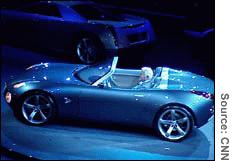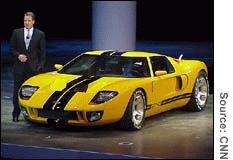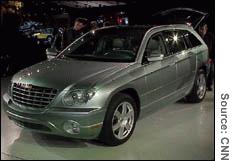|
Detroit's reality concept
|
 |
January 6, 2002: 10:13 p.m. ET
GM, Chrysler unveil concept vehicles that could soon be in dealer showrooms.
By Staff Writer Chris Isidore
|
DETROIT (CNN/Money) - Major automakers unveiled their visions of the future at an auto show here Sunday, and the main message for the beleaguered industry seemed to be that they will do what is needed to get the future here as soon as possible.
Sunday at the North American International Auto Show here is the day that the Big Three automakers traditionally unveil their so-called "concept vehicles," which are often flights of fancy for designers that never get anywhere near a dealer's showroom.
But this year General Motors Corp. (GM: Research, Estimates) unveiled concepts close enough to production that its executives talked about as if they were ready to start taking orders. Those four concept vehicles shared the stage at the show with three new production vehicles that had been concepts within the last few years.

|
|
|
GM Vice Chairman Bob Lutz drives the Solstice reality car into the Detroit auto show, and maybe into dealer showrooms relatively soon. | |
"There's a powerful sense of reality to our concepts," said Bob Lutz, GM's vice chairman and chairman of its North American operations. "These are vehicles we think people would purchase and drive today."
No. 3 automaker DaimlerChrysler (DCX: Research, Estimates) for the second year in a row skipped unveiling a true concept vehicle on Sunday an instead presented a pre-production version of the Pacifica, a new crossover vehicle that blurs the line between minivan and sedan that it is committed to building by next year.
Ford Motor Co. (F: Research, Estimates) took a more traditional approach to concept vehicles. It rolled out a massive F-350 pickup truck that is more likely to show up on toy store shelves than dealer showrooms, especially since it was co-branded with the Tonka toy truck name. And it also showed a new version of the GT-40 race car that, if it ever is built, will only be seen on the track, not the highway.
| |

|
|
Ford Chairman and CEO Bill Ford with the GT-40 concept car unveiled Sunday evening. | |
The main motivation for the GT-40 appeared to be to give Ford employees nervous about their future a morale boost, bringing back a car that helped Ford in a previous turnaround situation. Ford executives also insisted that many design elements of Sunday's concept F-350 will be seen in the next version of the F-series pickups due out for the 2004 model year.
Much of the change in the speed of concept cars coming to market is due to advances in computer-aided design.
The designers of the Cadillac Cien, unveiled Sunday, took only five weeks last fall to move from one design stage to another that would have taken three months only a couple of years ago, according to Simon Cox, GM's head of design in the United Kingdom who worked on the concept. The Pontiac Solstice, the roadster concept car unveiled Sunday, was first discussed by designers in September, but by using existing parts and components of other vehicles as well as new design tools, it was a working concept vehicle by Sunday.

|
|
|
DaimlerChrysler plans to start selling the Pacifica next year. | |
"There's nothing here to tell you this isn't a production vehicle," said Lutz about the Solstice.
But another part of the reason for the more realistic concepts is the desire to keep the interest of buyers and car enthusiasts in the current weak market.
Two years ago, when auto sales were still white hot, Ford unveiled concepts that were little more than computer platforms on wheels to emphasize its plans to bring Internet connections to vehicles. But with the current market weakness automakers want concept cars to try to find the next "hot" vehicle that will both identify and satisfy a desire of consumers in the relatively near future.
"One thing they are better able to do is listen to buyers more accurately," said David Cole, president of the center for automotive research. "If you can design it fast and build it quickly on a flexible production line, your risks of putting it in the market are greatly reduced."
With the improved technology, it is natural that there is more emphasis to come up with concepts that can reach market soon, said Cox.
"All the concept vehicles have moved a long way in their level of reality," he said.
With sales expected to fall sharply in 2002 and Ford and Chrysler Group still weighing cost cuts, this is a nervous time for many employees in the industry. Ford executives said Sunday that the concept cars show that they remain committed to invest in research and development, despite the current talk of layoffs and restructuring.
Click here for a look at auto stocks
"There's a lot on our minds these days at Ford, a lot of work to do," Nick Sheele, Ford's president and chief operating officer told media and Ford employees Sunday evening just before rolling out the GT-40. "We've rediscovered a very simple truth at Ford. You can not succeed in a product driven industry unless you are a product driven company." 
|
|
|
|
|
|

|

